

A man wearing the uniform and cap of a fast-food worker, his apron tucked into a pant pocket, approached a clerk at the Alameda County Social Service Agency. As he handed over documents for his public assistance benefits claim, the man explained how it had felt to be waiting in the lobby for the past several hours:
“I was the first here and the last to leave.”
“You should get a pay check!” the clerk responded.
The reality is that this man does “get a paycheck” from his minimum wage job, but finds himself unable to meet his basic needs. This is a common scene at my office in Oakland and public assistance offices across the country.
This month’s National Association of Social Workers’ theme is “All People Matter,” chosen to remind us of our profession’s commitment to improving social conditions for all.
» Read more about: ‘All People Matter’ — It’s Time to Raise the Minimum Wage »
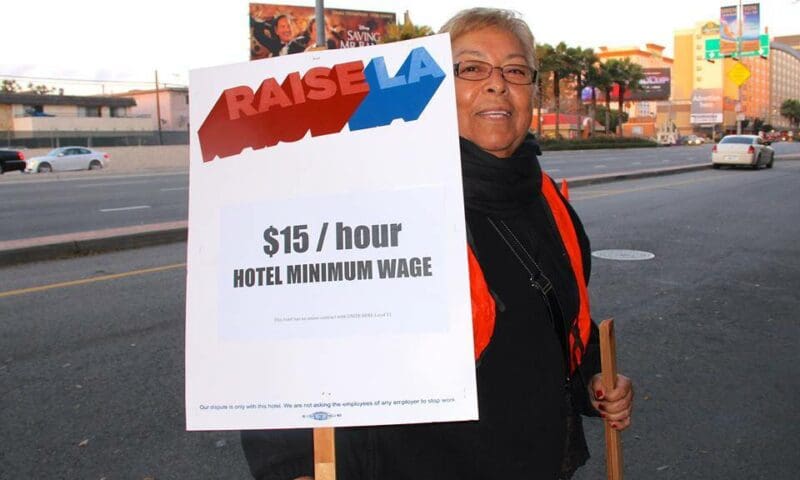
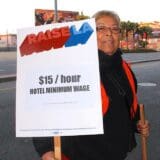
In an economy where constant, unpredictable change is a given, wages are one of the few things that have remained reliably stagnant. However, a growing national movement to address this increasingly visible issue is taking shape. Locally, Raise LA, a coalition of labor and community groups organized by the Los Angeles Alliance for a New Economy (LAANE), is part of a push to bring wages up to speed by advocating for better jobs in L.A.’s massive hospitality industry. According to a LAANE Raise LA report, “Residents, workers and businesses from communities across Los Angeles are united in the Raise LA Coalition in an effort to ensure that the city’s largest and most profitable hotels support the communities in which they operate.”
So why is Raise LA specifically focusing on hotels? One in 10 jobs in Los Angeles County is in the leisure and hospitality industry,
» Read more about: Raise LA Campaign Targets Hospitality Industry’s Low Wages »


The nomination of Californian Ted Mitchell to the number two position at the U.S. Department of Education is the latest indication that proponents of school privatization are continuing to gain influence over the Obama administration’s education policy.
“He represents the quintessence of the privatization movement,” Diane Ravitch, an education historian and former Assistant Secretary of Education under President George H.W. Bush, tells Capital & Main. “This is a signal the Obama administration is committed to moving forward aggressively with transferring public funds to private hands.”
In education “privatization” refers to the contracting out of traditional public education services to for-profit companies or to charter schools that are set up as nonprofit organizations. In many ways, the Mitchell nomination reflects the ongoing battle being fought in Washington and in school districts across the country. It’s a battle that pits the views of teachers, their unions and community groups against a movement that is backed by wealthy philanthropists and corporations.


The most difficult conversations for most activists happen with family. Particularly with parents or aunts and uncles, and cousins who disagree with a politically progressive perspective. My parents and I stopped talking about world events long before they died. I think that is a fairly normal behavior choice — just stop talking. When I visit with cousins who live in red states or the red parts of blue states, I almost always try to avoid any discussion that could lead to conflict. And I think they do too.
On the other hand, such difficult discussions are sometimes hard to avoid. Late last fall I received a screed forwarded by a cousin who lives in one of those red places on the map about an issue I thought had long gone the way of most such topical conflicts: the President’s birth certificate. I knew this was still a hot issue in some quarters during the President’s reelection,


Marina woke me up and told me the garage next door was on fire
I got off the couch and climbed on the brick wall with the hose
I pointed the hose at the neighbor’s smoking garage
Its walls emitted white light and exploded into sheets of flame
Marina did as I said and pounded on the window of the house, but
no one seemed to be home; those neighbors never said hello
I put water on their roof, which was starting to smoke as the garage
was wholly consumed, flames thirty feet in the air and even across
thirty or forty feet of concrete the roof of the house was catching fire
I yelled at Marina to tell someone to call the fire department, which
arrived and the house was saved
Marina only six or seven,


As the Vergara v. California trial ends its fourth week, the most conspicuous absence from the plaintiffs list may be that of the man most responsible for bringing the education lawsuit — David Welch, the 52-year-old Silicon Valley entrepreneur and founder of Students Matter. His Menlo Park-based nonprofit initiated Vergara and is picking up all of the plaintiffs’ attorneys and PR fees — a bill that was running nearly $3 million even before Welch’s high-powered legal team first set foot in Los Angeles Superior Court for the trial.
Vergara was filed on behalf of nine students and seeks to erase nearly a hundred years of teacher protections from the state education code that were adopted to prevent discriminatory and capricious terminations. The suit claims that five statutes addressing teacher dismissal, seniority and tenure disproportionately harm minority students in high-poverty schools by making it too difficult to fire incompetent teachers.
» Read more about: David Welch: The Man Behind Vergara v. California »


Are job protections for teachers to blame for educational underachievement among low-income students of color in California? That’s the provocative question ostensibly at the heart of Vergara vs. California, which seeks to invalidate the tenure, due process and seniority rights of hundreds of thousands of educators.
Astute observers of the nation’s escalating education wars, however, may be asking another question: When did it become permissible to use the welfare of children as a fig leaf for an all-out legal attack on teachers?
Or, as historian and teacher John Thompson wrote recently in Scholastic, “Are corporate reformers unabashedly using the courts as a battleground for battering employees’ rights, as opposed to helping children?”
Sadly, the answer to Thompson’s question appears to be an unequivocal yes. For while the outcome of Vergara will have far-reaching national implications, it is hardly unique in its attempt to scapegoat teachers for sub-par educational performance.
» Read more about: Vergara v. California’s Corporate Heart »
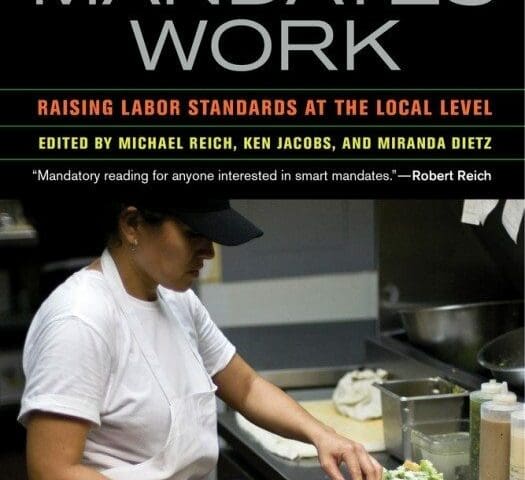
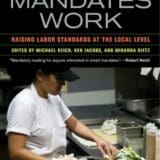
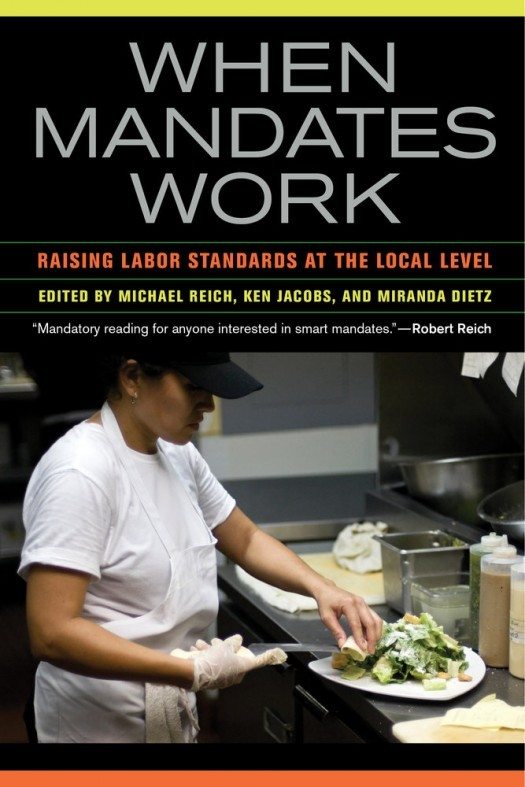 Forget, for the moment, downer news stories coming out of Midwestern statehouses, Southern auto plants and sundry federal courts. A new book edited and co-written by three Bay Area researchers optimistically chronicles what can be accomplished when progressive politicians and a determined electorate, backed by an energetic union movement, tackle income inequality, health care, labor peace and other challenges. When Mandates Work: Raising Labor Standards at the Local Level, edited by Michael Reich, Ken Jacobs and Miranda Dietz, parses a dozen years of legislation passed by San Francisco voters or their board of supervisors. Thanks to 10 ordinances enacted between 1996 and 2008 —
Forget, for the moment, downer news stories coming out of Midwestern statehouses, Southern auto plants and sundry federal courts. A new book edited and co-written by three Bay Area researchers optimistically chronicles what can be accomplished when progressive politicians and a determined electorate, backed by an energetic union movement, tackle income inequality, health care, labor peace and other challenges. When Mandates Work: Raising Labor Standards at the Local Level, edited by Michael Reich, Ken Jacobs and Miranda Dietz, parses a dozen years of legislation passed by San Francisco voters or their board of supervisors. Thanks to 10 ordinances enacted between 1996 and 2008 —
In an interview with Capital &
» Read more about: How San Francisco Created a New Social Compact: An Interview With Ken Jacobs »


After the President’s State of the Union address, federal policy circles are squarely focused on how to speed and grow America’s economic recovery. President Obama was right when he said America needs “a set of concrete, practical proposals to speed up growth, strengthen the middle class and build new ladders of opportunity.”
America’s public transportation infrastructure provides one excellent opportunity to build a more equitable, prosperous economy. Here are five policy prescriptions that can help create good jobs and growth in the transportation sector:
1. Make a globally competitive investment in infrastructure. Increase federal funding to address America’s infrastructure deficits identified by the American Society of Civil Engineers and detailed in the BlueGreen Alliance’s Repair America report, especially in the transportation sector. Investments in transportation can put Americans back to work while rebuilding our crumbling roads and bridges,
» Read more about: Five Policy Prescriptions for Transportation Job Creation and Growth »


 Last year Walmart commissioned a study on itself, and now its findings can be revealed: Walmart is the greatest thing since penicillin. More specifically, the study sees the chain-store titan’s widening footprint on America’s retail landscape as a gift for the communities lucky enough to have a Supercenter land on them.
Last year Walmart commissioned a study on itself, and now its findings can be revealed: Walmart is the greatest thing since penicillin. More specifically, the study sees the chain-store titan’s widening footprint on America’s retail landscape as a gift for the communities lucky enough to have a Supercenter land on them.
The research, conducted by the Hatamiya Group, a Davis-based firm owned by Lon Hatamiya, is predicated on a comparative analysis of taxable retail sales and retail business permits, and reaches two conclusions: “On average,” California communities with Walmart Supercenters in them have fared better economically than those without them.
Of course, while it may be difficult to name a community that doesn’t have a Walmart in it, California is a very large state and has places where even Walmart won’t tread – economic no-go zones that have been especially hard-hit by the recent recession and slow recovery.
» Read more about: Walmart’s New Research: A Flattering Self-Portrait »